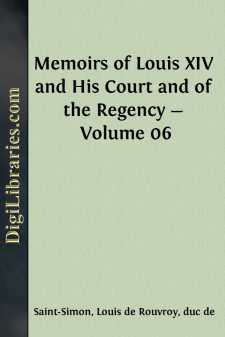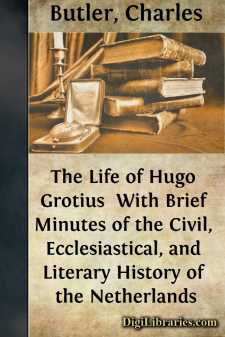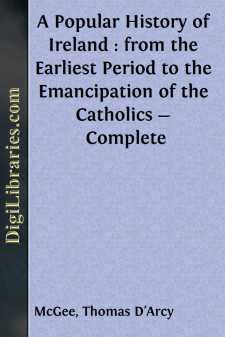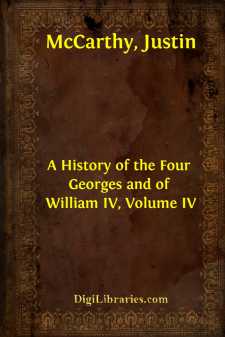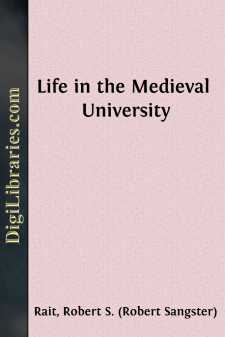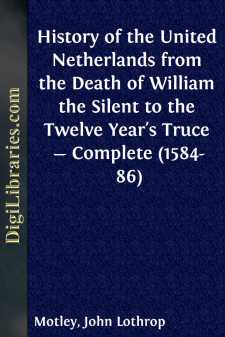History
- Africa 30
- Americas (North Central South West Indies) 50
- Ancient 68
- Asia 58
- Australia & New Zealand 8
- Canada 41
- Caribbean & West Indies 1
- Civilization 20
- Eastern Europe 12
- Europe
- Expeditions & Discoveries 60
- General 77
- Historical Geography 1
- Jewish 9
- Latin America 3
- Medieval 8
- Middle East 13
- Military 248
- Revolutionary 8
- Study & Teaching 5
- United States 353
- Western Europe 56
- World 13
Europe Books
Sort by:
I went this summer to Forges, to try, by means of the waters there, to get rid of a tertian fever that quinquina only suspended. While there I heard of a new enterprise on the part of the Princes of the blood, who, in the discredit in which the King held them, profited without measure by his desire for the grandeur of the illegitimate children, to acquire new advantages which were suffered because the...
more...
by:
Charles Butler
Boundaries and Devolution of the Empire of Germany during the Carlovingian Dynasty. 800-911. The Ocean on the north, the Danube on the south, the Rhine on the west, and the Sarmatian Provinces on the east, are the boundaries assigned by Tacitus to Antient Germany. It formed the most extensive portion of the territories of Charlemagne; descended, at his decease, to his son, Lewis the Debonnaire; and, on...
more...
When king Richard had resigned (as before is specified) the scepter and crowne; Henrie Plantagenet borne at Bullingbroke in the countie of Lincolne, duke of Lancaster and Hereford, earle of Derbie, Leicester, and Lincolne, sonne to Iohn of Gant duke of Lancaster, with generall consent both of the lords & commons, was published, proclamed, and declared king of England and of France, and lord of...
more...
Ireland, lifting herself from the dust, drying her tears, and proudly demanding her legitimate place among the nations of the earth, is a spectacle to cause immense progress in political philosophy. Behold a nation whose fame had spread over all the earth ere the flag of England had come into existence. For 500 years her life has been apparently extinguished. The fiercest whirlwind of oppression that...
more...
by:
Justin McCarthy
"OPENS AMID ILL OMENS." The closest student of history would find it hard indeed to turn to the account of any other royal reign which opened under conditions so peculiar and so unpropitious as those which accompanied the succession of George the Fourth to the English throne. Even in the pages of Gibbon one might look in vain for the story of a reign thus singularly darkened in its earliest...
more...
by:
William Smith
GEOGRAPHY OF GREECE. Greece is the southern portion of a great peninsula of Europe, washed on three sides by the Mediterranean Sea. It is bounded on the north by the Cambunian mountains, which separate it from Macedonia. It extends from the fortieth degree of latitude to the thirty-sixth, its greatest length being not more than 250 English miles, and its greatest breadth only 180. Its surface is...
more...
PREFACE. Once more I come before the public with a work on the history of a nation which is not mine by birth. It is the ambition of all nations which enjoy a literary culture to possess a harmonious and vivid narrative of their own past history. And it is of inestimable value to any people to obtain such a narrative, which shall comprehend all epochs, be true to fact and, while resting on thorough...
more...
INTRODUCTORY "A Clerk ther was of Oxenford also,That unto logik hadde longe y-goAs lene was his hors as is a rake,And he was not right fat, I undertake;But loked holwe, and therto soberly,Ful thredbar was his overest courtepy,For he had geten him yet no benefyce,Ne was so worldly for to have offyce.For him was lever have at his beddes heedTwenty bokes, clad in blak or reed,Of Aristotle and his...
more...
PREFACE TO THE FIFTH VOLUME. I HAVE thought it right to publish that portion of the continuation of the "History of England" which was fairly transcribed and revised by Lord Macaulay. It is given to the world precisely as it was left: no connecting link has been added; no reference verified; no authority sought for or examined. It would indeed have been possible, with the help I might have...
more...
PREFACE. The indulgence with which the History of the Rise of the Dutch Republic was received has encouraged me to prosecute my task with renewed industry. A single word seems necessary to explain the somewhat increased proportions which the present work has assumed over the original design. The intimate connection which was formed between the Kingdom of England and the Republic of Holland, immediately...
more...


